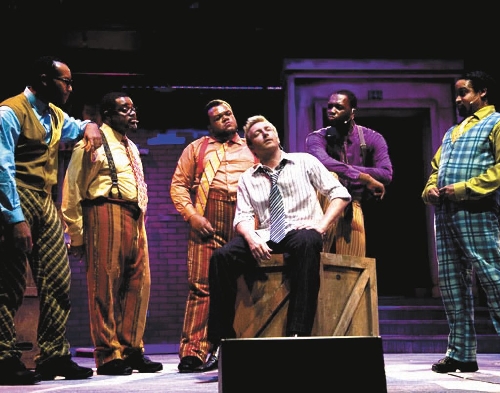Examining jukebox musicals as ‘Five Guys Named Moe’ climaxes Super Summer season

Press D-6. Get Broadway musical.
Who knew that one day, that bulky malt-shop icon would become synonymous with one of our great art forms?
"Jukebox musicals" are those prefab shows that co-opt pop hits of a particular artist as their entire score and sketch a narrative structure around them.
Prep for another — a Vegas first-timer — when "Five Guys Named Moe" opens tonight at Spring Mountain Ranch State Park, closing the curtain on the 2011 Super Summer Theatre season.
"This script has been a challenge to make it work and you have to take a different approach to it," says director Steve Huntsman. "Where music is such a huge focus, you have to keep the energy going. The storytelling mostly happens in the music because the songs themselves are all individual stories."
Riding the repertoire of Louis Jordan — the 1930s-’50s jazz/R&B artist appropriately called "King of the Jukebox" in his prime who helped open the way for rock ‘n’ roll — "Moe" offers a plot (i.e., trigger for the jamboree) featuring a downtrodden hero named Nomax.
Downcast and despairing (his woman split, he’s destitute), Nomax is visited by the titular Moes — "Big Moe," "Four-Eyed Moe," "Eat Moe," "Little Moe" and "No Moe" — who spring from his radio to perk him up with Jordan jumpers such as "Saturday Night Fish Fry," "Let the Good Times Roll" and "Is You Is or Is You Ain’t My Baby?" Audience participation is encouraged, including dancing in the meadow, so warm up those happy feet.
"It’s a revue, not a book musical, in a sense a jukebox musical," Huntsman says. "I wasn’t originally attracted to the piece because it’s so far removed from something I usually do, but I really fell in love with it, with Louis Jordan’s music."
Once upon an old-fashioned time, musical devotees fell in love with composers from Rodgers and Hammerstein to Stephen Sondheim. Composers whose songs were written primarily to serve stories and, many of which, incidentally became worldwide hits, rather than songs that journeyed up and down the pop/rock charts before becoming tent-poles for shows that are essentially razzle-dazzle tributes, lending the artists some borrowed Broadway sheen.
Several critics noted that just the term "jukebox musical" — dubbed, no doubt sarcastically, by New York Times critic Ben Brantley in the early ’90s — cheapens the legacy of musical theater before you even get to its treatment of plots as mere excuses for scores that are really greatest-hits albums.
Yet, with its preponderance of nostalgia artists baby boomers cherish — Elvis Presley, Billy Joel, the Beach Boys, John Lennon, Queen, the Bee Gees, Bob Dylan, etc. — the genre performs an undeniable service: It turns theater-avoiders into theatergoers in an era when theater, long ago eclipsed by movies and TV and now up against entertainment on electronic platforms from people’s computers to their phones, needs every advantage.
Certainly in community theater markets such as Las Vegas, where interest often is tough to scrounge up, jukebox musicals produced here — "Moe," "Smokey Joe’s Cafe" (music of composers Jerry Leiber and Mike Stoller), "Forever Plaid" (harmony groups like the Four Freshmen) and "Buddy! The Buddy Holly Story," among others — are appreciated as box-office boosts.
Creatively? "Jersey Boys" made itself comfy on Broadway and on the Strip, celebrating Frankie Valli and the Four Seasons by maintaining the music but tweaking the formula so its plot is not an excuse to sing, but a legit story of show-biz survival that chronicles their dramatic rise. An actual story arc.
"Mamma Mia" is the genre’s grandest success, assembled completely backward from a traditional musical, with a full-fledged plot: about-to-be bride invites the three men who could be her father to her wedding on a Greek island, where Mom relives her past through ABBA hits. Ingeniously, "Mamma Mia" ropes in both the ABBA crowd that might otherwise dismiss musical theater, and true lovers of the genre with a viable story set to music they fondly remember merged into a score.
Other hits: "Movin Out" (Billy Joel), "All Shook Up" (Elvis), "Million Dollar Quartet" (coming on tour to the Smith Center for the Performing Arts, featuring the music of Elvis, Jerry Lee Lewis, Johnny Cash and Carl Perkins) and "American Idiot" (Green Day).
Flops? Many — again, many. Few mourn the loss of "Ring of Fire" (Johnny Cash), "Good Vibrations" (the Beach Boys), "Lennon," "Hot Feet" (Earth, Wind and Fire) and "The Times They Are a-Changin’" (Bob Dylan), among a crop of them.
Do they cheapen musical theater? As individual shows, it’s case by case. Taken as a genre? Yes, they do. Rehashes — even if spectacularly repackaged — do not advance a sophisticated art form, they merely feed off it. In most cases, it’s well-intentioned exploitation.
However, in an era when Broadway prices could cause a family to cash in a bank account for a night out, jukebox musicals are closer to a sure bet of theater satisfaction — just pick the one with the artist you love — than an original show, the quality of its score a gamble.
That thinking also serves local theater, which needs to draw that reticent audience even more than its Big Daddy back east.
Beginning tonight, they do it one "Moe" time.
Contact reporter Steve Bornfeld at sbornfeld@review journal.com or 702-383-0256.